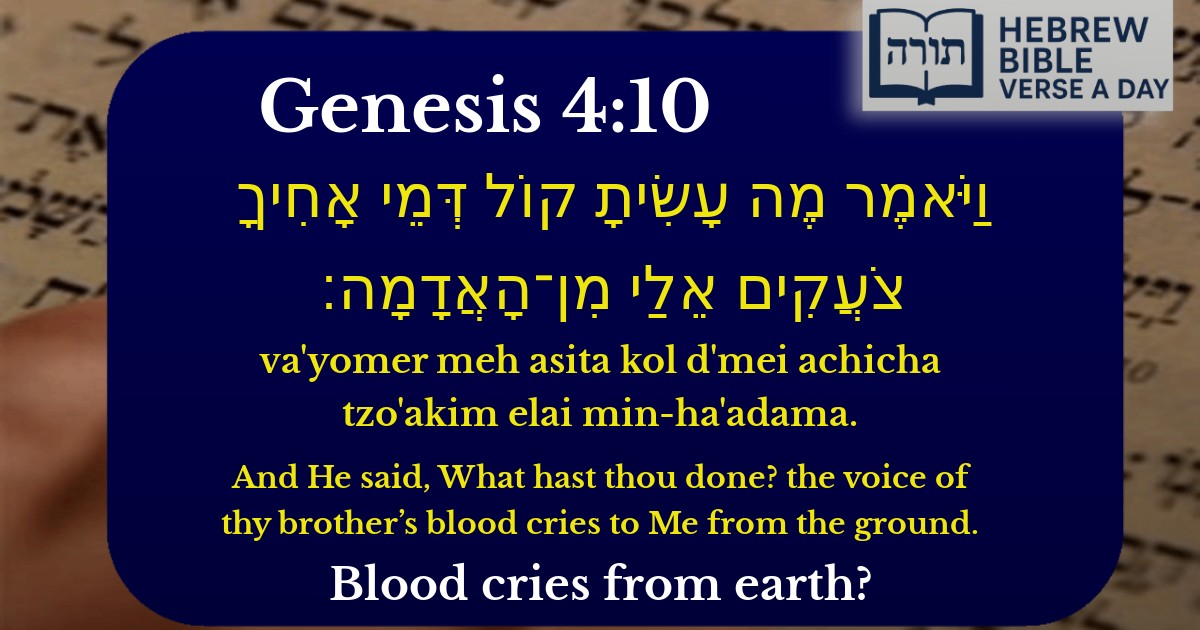Join Our Newsletter To Be Informed When New Videos Are Posted
Join the thousands of fellow Studends who rely on our videos to learn how to read the bible in Hebrew for free!
Hebrew Text
וַיֹּאמֶר מֶה עָשִׂיתָ קוֹל דְּמֵי אָחִיךָ צֹעֲקִים אֵלַי מִן־הָאֲדָמָה׃
English Translation
And He said, What hast thou done? the voice of thy brother’s blood cries to Me from the ground.
Transliteration
Va'yomer meh asita kol d'mei achicha tzo'akim elai min-ha'adama.
Hebrew Leining Text
וַיֹּ֖אמֶר מֶ֣ה עָשִׂ֑יתָ ק֚וֹל דְּמֵ֣י אָחִ֔יךָ צֹעֲקִ֥ים אֵלַ֖י מִן־הָֽאֲדָמָֽה׃
וַיֹּ֖אמֶר מֶ֣ה עָשִׂ֑יתָ ק֚וֹל דְּמֵ֣י אָחִ֔יךָ צֹעֲקִ֥ים אֵלַ֖י מִן־הָֽאֲדָמָֽה׃
🎵 Listen to leining
Parasha Commentary
📚 Talmud Citations
This verse is quoted in the Talmud.
📖 Sanhedrin 37a
The verse is cited in the context of discussing the gravity of murder, emphasizing that the blood of the victim cries out for justice.
📖 Berakhot 58a
The verse is referenced in a discussion about divine justice and the concept that nothing is hidden from God.


The Cry of the Blood
The verse (Bereshit 4:10) states, "the voice of thy brother’s blood cries to Me from the ground." Rashi explains that the word "דְּמֵי" (blood) is written in the plural form to indicate that not only was Abel's blood spilled, but also the blood of his potential descendants—emphasizing the gravity of murder, which extinguishes an entire lineage (Rashi on Bereshit 4:10). The Midrash (Bereshit Rabbah 22:9) elaborates that the earth refused to absorb Abel's blood, leaving it exposed as a testimony to Cain’s sin.
Divine Justice and Accountability
Rambam (Hilchot Rotzeach 1:4) derives from this verse that murder is a capital offense because human life is sacred, created in the image of G-d. The phrase "cries to Me from the ground" teaches that even when human justice fails, divine justice prevails—no crime, especially bloodshed, goes unaccounted for (Sforno on Bereshit 4:10). The Talmud (Sanhedrin 37a) further connects this idea to the principle that one who destroys a single life is considered as if they destroyed an entire world.
The Moral Lesson
The Kli Yakar highlights that Cain’s sin was not merely the act of murder but his callousness afterward—he denied responsibility, prompting G-d to declare that the earth itself would testify against him. This teaches that moral accountability extends beyond human courts; creation itself bears witness to injustice (Kli Yakar on Bereshit 4:10). The Netziv adds that the "voice" of the blood symbolizes the unceasing demand for justice, urging repentance and rectification (Ha'amek Davar on Bereshit 4:10).